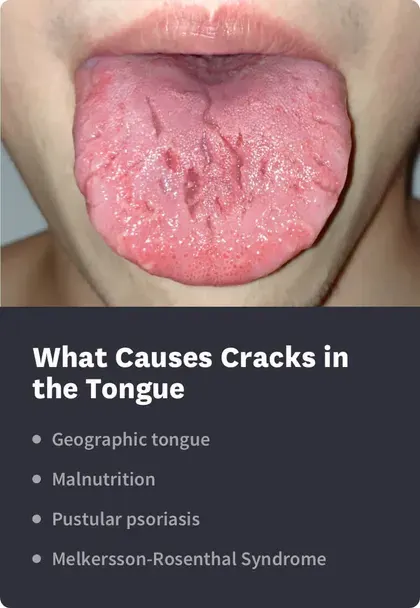Cracks in Tongue - Causes & Treatment for Fissured Tongue

Table of Contents
- Causes of Tongue Crack
- Cracks vs. Cuts
- Dehydration & your Tongue
- Treatment Options
- Preventing Cracked Tongue
- Symptoms & Signs
Shallow grooves, known as fissures, can develop on the surface of your tongue. Cracks in the tongue are relatively common. For example, in a 2015 study of 1,000 people, 387 had a fissured tongue.
The number, depth and size of these cracks differ from person to person, and sometimes they can look like a serious condition. Generally, though, it is not.
Doctors and dentists insist that the condition does not pose a health risk and can be controlled by a healthy oral care regimen.
Causes of Tongue Crack

Tongue fissures are a bit of a mystery. Clinicians don’t know definitively what causes them.
One study from 2016 links them to smoking, and others hint at a genetic cause, a condition that is hereditary.
At times, cracks can occur along with other health issues: malnutrition, geographic tongue, Melkersson-Rosenthal syndrome, and pustular psoriasis.
The following causes are suspected:
In a study conducted in 2019 in Afghanistan, researchers found that people who used smokeless tobacco (called nass in that country) were much more likely to have fissured tongue than those who did not. The study is small, but it does suggest that people using these products could be at risk for tongue cracks.
At times, cracks can occur along with other health issues: malnutrition, geographic tongue, Melkersson-Rosenthal syndrome, and pustular psoriasis.
A study conducted in 2016 links fissures to a deficiency in vitamin B12. It found that a lack of B vitamins, zinc, and iron can play a role in the development of grooves.
People with improperly balanced diets also stand a higher chance of wrestling with this condition.
Other causes can include side effects from a prescription medication and untreated acid reflux.
Physicians also look at an oral health issue is also known as benign migratory glossitis (BMG), or Geographic Tongue. This condition causes both smooth and raised patches on the tongue. BMG poses no major health concerns, but it can cause a sensitivity to spicy food and drinks.
Another potential cause is Melkersson-Rosenthal Syndrome, which is a sporadic neurological disorder. With this condition, however, a cracked tongue is only one symptom, along with facial swelling and paralysis on the face (Bell's Palsy).
Pustular psoriasis is an inflammatory condition caused by an immune disorder. It affects the skin and joints.
Widespread skin inflammation results in small, white or yellow blisters or pimples. It’s common for someone with tongue cracks to experience these minor infections on their tongue.
Poor oral hygiene—not brushing and flossing your teeth and gargling daily, at a minimum—can cause tongues to develop cracks and even lesions.
In addition, researchers point to drug side effects as a possible cause for cracks, grooves and fissures.
Myths About Cracks in Tongue
The biggest myth about tongue cracks involves severity. Some people are convinced that all tongues should be bright pink and perfectly smooth. If they see even one crack, they believe something has gone seriously wrong with their health.
Know that many people have tongue cracks that are perfectly harmless and don’t stem from a serious health condition. Your tongue is just cracked!
Symptoms & Signs
Most of the time, a fissured tongue presents with no symptoms beyond appearance. It is usually painless, and it does not bleed or drain.
The most obvious signs, of course, are the cracks themselves. Cracks can vary by:
Number
Size
Direction (horizontal, vertical, or branching)
Depth
In most cases, a fissured tongue appears as though the tongue is split. Multiple fissures may appear on the tongue surface, and people may have significant cracks that are visible. The mid part of your tongue is commonly affected, but issues may also be evident in other parts.
A fissured tongue is neither harmful nor contagious. In some cases, there are no symptoms at all.
But one symptom of the condition is oversensitivity when eating and drinking. Nerves on the tongue are more exposed, and foods that aren’t generally thought to be too cold or too hot can be difficult to handle.
A cracked tongue can be confused with other health issues that impact your oral health. This chart can help you understand the differences:
| What does it look like? | What does it feel like? | How is it treated? |
Cracks on the tongue | Nothing | No treatment is required | |
Red spots surrounded by an irregular, white border | Sometimes, a burning or smarting sensation | Anesthetics or steroids (if it’s uncomfortable) | |
White, cottage cheese-like plaque on the mouth’s surface | Pain or burning sensations, change in taste | Better oral hygiene practices and antifungal medication |
Cracks vs. Cuts on the Tongue
When people refer to cuts on their tongue, they are (in most cases) referring to cracks on their tongue (a fissured tongue). The cracks from a fissured tongue can appear (and feel) like small cuts, but they are grooves formed by a fissured tongue or geographic tongue. These grooves usually range from 2 to 6 mm in depth.
When healthy, your tongue will be pink and moist. Tiny mucous membranes called papillae cover the tongue’s surface. Some contain taste buds, and others just help with daily activities like speaking and gripping food.
A fissured tongue occurs when there is irregular papillae growth or loss. This can cause inflammation, pain, and sensitivity.
Dehydration & your Tongue
While dehydration alone isn’t the cause of tongue cracks, it may be a factor. Dehydration may cause your tongue to become rough and dry.
A dry tongue may be more prone to cracks and irritation. Dehydration can also weaken your immune system, increasing the risk of tongue fissures and making it harder to heal from them.
Dehydration can contribute to tongue issues like fissures and geographic tongue in other ways, or it can cause complications with these issues.
A dry tongue is a symptom of dry mouth. If you have dry mouth, you are not producing enough saliva. Saliva production is key to oral health, as it helps to combat harmful bacteria (including plaque) and neutralizes the enamel-damaging acids created by bacteria. Keeping your mouth and tongue hydrated will help improve your oral health and may help to prevent tongue fissures.
If you already have a fissured or geographic tongue, it’s important to ensure that you’re not dehydrated and don’t have a dry tongue. The grooves caused by a fissured tongue can become hotspots for bacteria and food particles to hide. If left lodged in the grooves, the bacteria and particles can result in problems like bad breath, decay, and even infection.
Treatments for Tongue Cracks
No strict medical treatment is necessary for tongue cracks because they are rarely a health risk. However, deep cracks in your tongue can trap food and debris, which can lead to bad breath. If your tongue is cracked, you’ll need to clean it carefully.
Clean your tongue with a toothbrush to remove food debris from the fissures. Place a small amount of toothpaste on a soft-bristled brush, and rub the bristles across the entire surface of your tongue. It should take less than a minute to brush. Rinse when done.
If your tongue doesn’t feel crisp and clean, consider a tongue scraper. These devices are long and flat with two handles. Place the scrubbing side down and rub it over your tongue several times, using light and even pressure. Rinse it before you put it away.
Mouthwash can kill bacteria inside your mouth, and it could be good for your tongue too. Rinse a dentist-approved product through your mouth once or twice per day when you’ve finished brushing and flossing.
Preventing Future Cracked Tongue Issues
Here are ways to help prevent the development of a cracked tongue:
Eat a balanced diet. That means a mix of proteins, vegetables, grain, fruits and nuts. Foods that have vitamins, zinc and iron will help you improve your oral health.
Practice good oral hygiene. Taking time to clean your teeth, gums and tongue will go a long way toward improving your oral hygiene. Dentists recommend spending at least two minutes twice a day brushing your teeth.
Scrape your tongue. This helps small particles of food from collecting in your mouth, which can lead to excess growth of bacteria.
Avoid spicy foods and drinks. This is especially true if you already know that you’re prone to developing a cracked tongue.
Eat cooler. If you are served a meal that is piping hot, let it cool down before you dig in.
If you experience tongue fissures accompanied by lesions (painful or not), discuss them with your dentist or primary care physician. One or both can help you understand the underlying cause, provide a detailed treatment plan, and help you find relief.
Fissured Tongue Frequently Asked Questions
Dehydration will make your tongue dry, sticky and white (a condition known as white tongue), but it cannot cause a cracked tongue. When dehydrated, most people experience dryness and rough textures on their lips, whereas the tongue becomes sticky but doesn’t crack. It’s possible that lips and the skin surrounding the mouth may appear dry, chafed and cracked.
Cracked or fissured tongues don’t always require medical treatment, and the condition resolves itself after a while. How long it takes to heal depends on how often you brush, floss and gargle. The more cleaning you do, the faster the healing time. Regular tongue scraping can also improve the recovery rate.
